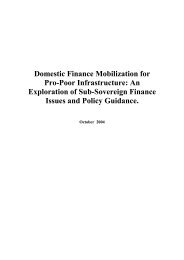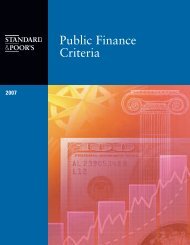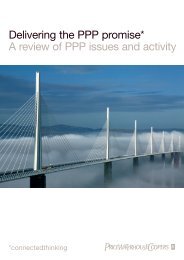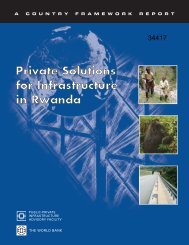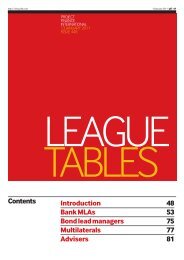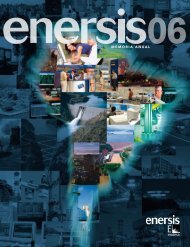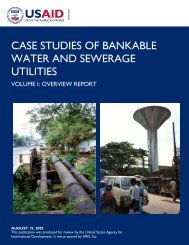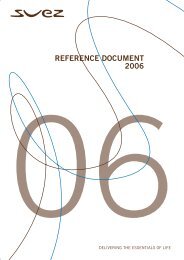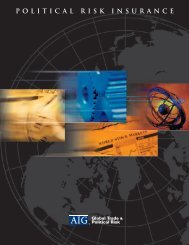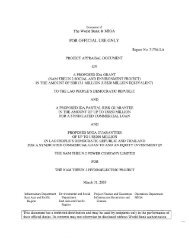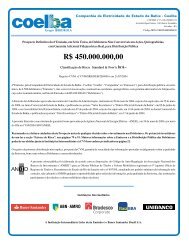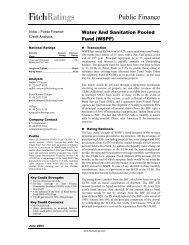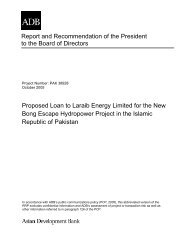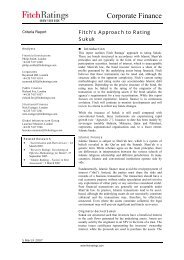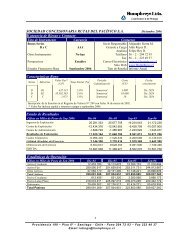EAP - The Pacific Infrastructure Challenge - World Bank (2006).pdf
EAP - The Pacific Infrastructure Challenge - World Bank (2006).pdf
EAP - The Pacific Infrastructure Challenge - World Bank (2006).pdf
You also want an ePaper? Increase the reach of your titles
YUMPU automatically turns print PDFs into web optimized ePapers that Google loves.
Box A. Box A13 : Troubled Times for Tongan Airlines<br />
Royal Tongan Airlines (RTA), formerly Friendly Island Airways, was the national carrier of the<br />
Kingdom of Tonga until 2004. Owned by the Tongan government, it operated both national and<br />
international services. <strong>The</strong> airline’s international routes linked Tongatapu with Sydney, Auckland,<br />
Nadi, Apia, Honolulu and Niue, and included code-shared flights with Air <strong>Pacific</strong> and Air New<br />
Zealand. Inter-island air services linking Tongatapu with ‘Eua, and the Ha’apai and Vava’u island<br />
groups ran daily except for Sundays, a strongly enforced day of rest and religious observation in the<br />
island nation. Service to the outer-island Niua group was infrequent, due to the small population and<br />
lack of demand, with flights leaving only around once per month.<br />
<strong>The</strong> airline acquired its first aircraft, two Twin Otters, in 1989. After this, services were increased<br />
through leasing aircraft. This included a 737-300 aircraft from Air <strong>Pacific</strong>, to maintain international<br />
services to New Zealand, Samoa and Fiji, an HS 748 aircraft from Mt Cook Airlines, to fly on the route<br />
via Vava'u to Nadi in Fiji, and a Hawker Sidley S748 Twin Otter for twice weekly service to Niue. A<br />
Royal Brunei Airlines Boeing 757 was chartered in November 2003, and used for the “Tongan Sea<br />
Eagle” route to Hawai’i, inaugurated in January 2004. This service was stopped suddenly in April 2004<br />
when the aircraft was returned to its owner.<br />
<strong>The</strong> repossession signaled the beginning of the end for RTA, which had been in financial difficulty for<br />
some time and was chiefly reliant on significant governmental support from public funds to remain<br />
aloft. Such support had allowed the airline, in spite of critical financial shortfalls, to extend its services<br />
in November 2003. Fuel suppliers, other airlines and travel agents, in recognition of the airline’s poor<br />
credit status, had begun insisting on cash payments in the months prior to the Royal Brunei aircraft’s<br />
repossession, but significant amounts were still owed - a debt unable to be met by the Tongan<br />
government, which had recently suffered another financial disaster when the king loaned US$42.7<br />
million to his court jester, who lost it on ill-chosen investments.<br />
In May 2004, domestic operations of RTA were also brought to a halt, and the government appointed a<br />
liquidator to close down the airline’s operations, acknowledging its severe financial problems.<br />
Severance arrangements for hundreds of Royal Tongan employees were negotiated, and compensation<br />
paid to international passengers stranded by the airline’s sudden demise. <strong>The</strong> government began<br />
exploring the possibility of private sector participation to ensure Tonga retained dedicated, locallybased<br />
airline links with the outside world, in line with the economic reform program launched in 2002<br />
emphasizing the development of the private sector and the creation of a level field for entrepreneurial<br />
competition. However, negotiations in this area appear to have failed and the nation is now reliant on<br />
international services from outside operators.<br />
Domestic services were restored in June 2004 when Peau ‘o Vava’u, run by New Zealand company Pion<br />
Air operating in affiliation with a local counterpart, was granted a license to operate daily flights in its<br />
two 70-year-old DC3s from Tongatapu to Vava'u and Ha’apai. <strong>The</strong> busy routes attracted a number of<br />
contenders to operate the service, including local company FlyNiu Airlines, owned and operated by<br />
former staff of RTA. FlyNiu was also granted a license to operate on the Vava’u and Ha’apai routes in a<br />
Dash 8 leased from Air National of New Zealand, but in a controversial decision six weeks later the<br />
Ministry of Civil Aviation announced that only one airline would be allowed to operate domestically,<br />
and both airlines would have to reapply for this license. Several members of Tonga's Royal Cabinet<br />
were forced to resign after opposing the idea of the monopoly airline, but little surprise was expressed<br />
when the Prime Minister awarded the sole license to Peau ‘o Vava’u, an airline in which his brother, the<br />
Crown Prince, has a half-share. <strong>The</strong> controversy has illustrated that, despite plans for reform, the<br />
aviation industry in Tonga is still very much under governmental control.<br />
Source: Matangi Tonga (www.matangitonga.to)<br />
153



